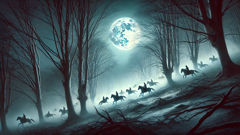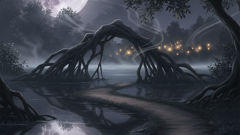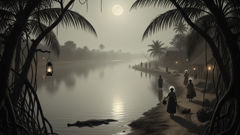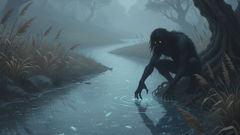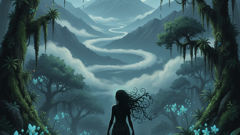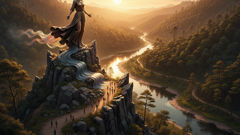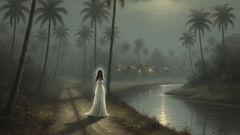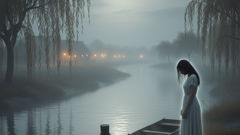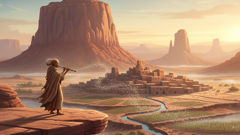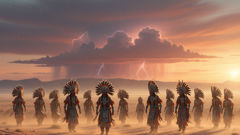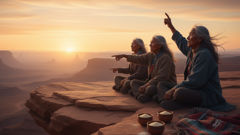Introduction
On the edge of winter, when the sap has sunk into roots and the village lights sit like distant watchfires, the forests of the old German lands remember their own names. It is there, under the black ribs of naked beech and oak, where the stories begin that elders whisper into the palms of children and travelers hold like small, warm stones. The Wild Hunt — a cavalcade of spectral riders, a chorus of distant horns and clattering hooves that belong to neither the living nor the dead — is older than any single county. It rides on nights when the moon dips thin and blue, when a frost breathes over heath and hollow. People in these parts do not speak of it casually; the tale is a way to measure courage, to explain a missing shepherd, to mark the turning of seasons and the rending edges of the world. Some say the hunt is the army of a forsaken king seeking his lost crown; others claim it is a storm of spirits that chases the souls of reckoners and oath-breakers through the winter wood. In certain places the leader wears a red sash, in others he carries a horn carved with runes, and sometimes the hunters are women with faces pale as swan-bone. Each telling adds a ring to the rumor, a notch to the warning. Yet beneath all versions is the same invitation: to listen closely when the trees fall silent and the night tolls its own strange bell, for the Wild Hunt rides not only past the living but into their decisions, calling each listener to a choice that will be remembered by the forest long after their hearthstone grows cold.
Origins and Echoes of an Old Pursuit
The Wild Hunt does not come from one mind nor one map. It is a chorus built of many voices across forests, fens and uplands: echoes of pre-Christian processions mingled with later medieval anxieties, with local weather-sickness and the steady human habit of answering the unknown with a story. In the valleys where the Rhine’s tributaries curl and the Low German marshes breathe, people feared the wind in the reeds; they gave the wind riders. In the slate hills, where the winter sun can seem a coin dropped into frost, they named the cavalcade after an angry lord who had refused God and life and now hunted forever. To the north the leader might be Woden, shepherd of the wild dead; to the west, a baron punished for his violence; in other retellings, a witch-queen leads a train of hearthless women and hounds. This multiplicity is the Hunt’s art: it borrows faces from the land that remembers it.

Across the centuries, the Hunt collected reasons for its passage. Where famine had bitten and children whispered of strange lights, the story shaped the fear into pattern: when the Hunt rides, dogs howl and weather shifts, there might follow a season of hardship or of swift, inexplicable windfalls. Church scribes stamped interpretations upon the old story, sometimes claiming it a devilish parade meant to lull the faithful into temptation, sometimes recasting it as an omen of apocalypse. But in the cottages, the tale kept its older grammar: a warning and a bargain. Leave out food for a beggar, respect the wood’s borders, don’t hunt a white stag on the wrong night — these were not mere superstitions, they were neighborhood law in places where ancestral memory measured survival.
The Hunt’s imagery adapted with human needs. When iron trade grew and towns bristled with markets, merchants told of riders sweeping across roads, snatching ringed purses from the unwary. When plague moved like a grey shadow, the Hunt’s horns were said to lead the dead to their resting places, or else to call the next crop of grief. At times the tale became bittersweet: those who had died unavenged might ride with the Hunt and find some semblance of justice; those who had taken oaths and broken them were forced to ride until repentance or the last bell of the world. Even place names and markers retain the story’s pressure: a heap of stone upon a hill may be called the Hunt’s Cairn; a hollow might be the Old Rider’s Gap. These small geographies keep the myth practical and local: a story is useful if it points to the slate where a child should not play, the fen where peat traps the unwary, a hollow where a traveler could be lost.
Despite its variations, three kinds of moments recur when the Hunt visits. The first is the warning: a wind that smells of iron, animals that stare, dogs that will not sleep. The second is the spectacle: a thunder of hooves like rain on rooves, a line of lanterns moving through the trees with a howl that is not entirely human. The third is the aftermath: a silence that presses down like a lid and the slow taking of count in the morning — missing sheep, a door ajar, frost arranged in shapes like footprints. These stages anchor the tale as practical myth: it matters, not only how frightening the riders are, but what happens around them. Across villages, a common practice arose: stay indoors, lock the barn, cover the threshing-floor; if you must pass through the wood, carry salt and a lamp with three knots burned. The number three is everywhere — three knots, three knocks, three turns — a folk arithmetic that stands between ordinary life and the Hunt’s claim.
Yet for all its terror, the hunt sometimes brings personal revelation. Folk tales tell of small, quiet bargains: a widow lays out bread and a bowl of ale for the passing riders and wakes to find her barn untouched and her last year’s sow grown fat; a woodcutter glimpses the leader and is granted a single wish for his oldest child. Such tales framed the Hunt as a test of hospitality as much as of fear. Hospitality, in these stories, is a means of entering the old law: if you respect the thresholds between your home and the forest, you remain human and part of a living continuity. If you mock those borders, or betray a guest, the Hunt will wake and take measure.
What of the riders themselves? Descriptions vary as wildly as the landscapes that birthed them. Sometimes they are pale and gaunt as fern-fronds, their mouths open in a sound like wind through bone. Their horses might be black waterhorses with mane like kelp, or white as birch bark, their hooves flaring cold mist. The hunters’ eyes can be bright as brass or empty as a cider-jar. Weapons are those of the old world — hunting spears, horns, knives — but sometimes they carry instruments of vanished trades: a wheelwright’s hammer, a tanner’s knife, a lordly spur. Such details anchor the supernatural to the familiar, as though the Hunt repurposes the town’s own life into an accusation or an offering. The leader’s identity is the key that changes the tale’s meaning: a godlike figure pulls the story toward cosmic meaning; a lord punished for cruelty turns it into moral consequence; a town woman at the head refocuses the tale on fertility, sorrow, and female power.
Over time, the Hunt moved into written records, where its plain terror entered new forms. Chroniclers told of whole villages who bolted doors at the sound of horns; jurists debated whether the Hunt was devil’s work or something older; poets wrapped the cavalcade in elegiac images. In the nineteenth century, when collectors like the Brothers Grimm sought to gather Germany’s oral topography, the Wild Hunt became part of an effort to preserve language and memory. Their versions smoothed some rough edges and amplified others, transmuting local admonitions into national myth. Yet underneath the romantic sheen remained a practical folk consciousness: the Hunt is a story that keeps people careful with the land and mindful of small acts — close the gate, feed the bellwether, do not usurp another’s field by moonlight.
Finally, the Wild Hunt endures because it answers the human need to name the wild. When the world feels dizzy with change — when new laws or wars arrive, when harvests fail or strange weather comes — people summon the hunt as both explanation and ritual remedy. To tell the tale is to set limits on what the night can claim. To listen is to be part of the listening community, the informal committee of those who have learned how to live near the forest. The riders may be many things: omen, punishment, memory, or simply the wind made story. But across all versions, they do one essential thing: they pull the living back toward the idea that land remembers, and that memory is often more patient and more dangerous than any landlord or priest.
Thus the Wild Hunt is not merely a fright for children but a woven map of the old moral and ecological rules. Its legacy is stitched across hearth-songs and border stones, and it waits, with its horns and its honors, for the next winter night when a traveler stumbles, the dog will not sleep, and the world tilts just enough for the old noise to cross the light between trees.
A Night with the Hunt
Lukas had been warned before his father died. The old man had a way of turning the spade in his hands and telling stories like directions. “If you hear the horns at the edge of the beech ridge,” he would say, “do not answer them. Cover the latch with salt, and make three rounds of your house before you sleep.” Such rules were given concrete value in a small village where the forest came close enough to touch the eaves. When the winter of Lukas’s twenty-third year arrived thin and clear, it brought nights so bright with frost that one could count each star, yet heavy with a silence that felt like held breath.
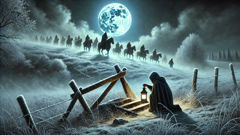
On the night that made his story, Lukas returned from the market late, his cart heavier with trade cloth and lighter with coins. The road hummed under his wheels, and the hedgerows cracked as foxes rustled. He had been thinking of a new plow when the dogs began to bark — an odd, far-off chorus that rose and fell like a storm wind. It was not a sound that fit the winter’s small music. He stopped, and the air seemed to taste of metal and old leaves. From the ridge beyond the stream came a pattern: three low notes, then a roll like distant thunder. Lukas felt the hair along his nape stand as if it were remembering a story before he could form it into words.
He had a choice: turn his cart back to the village and spend the night with locked doors, or cut through the meadow and risk being on the road when the riders passed. Pride and need nudged him forward; he thought of the coins, the price of seed, the slow duty of keeping his mother’s house. He coughed and slid down the cart’s side, palm on his lantern. The path across the meadow was bright with frost and the stars silvered the thistles. As he walked, the sound of horns formed into a rhythm that felt like teeth gnawing space between his ribs. Shapes moved along the ridge: at first, mere darker smudges against thin moonlight, then bodies, then riders, as if a curtain had been drawn and a whole world revealed behind it.
They did not ride like ordinary men. Their mounts moved with a noise like water and ice, their coats frosted. The riders themselves were of many kinds. An old man in a robe that smelled of lavender and smoke blew a horn from which small lights floated like fireflies; a woman with hair as white as frozen wheat had a hawk on her wrist whose eyes reflected the moon; a youth with a soldier’s crest but no metal left on his breast rode with a laugh that sounded like the breaking of dry wood. The leader was neither fully human nor god: tall, wrapped in a cloak of fox-skin, with a face that kept sliding from the shape of a nobleman to that of a pine-scented wind. He raised his horn and the sound fell through the meadow, and a low answering murmur came from the trees as if they, too, remembered the tune.
Lukas felt his feet root in frosted grass. For a long moment nothing moved but the world’s breath. Then a rider broke from the line and veered straight toward him, the horse’s nostrils steaming and the rider’s eyes like polished coal. Lukas heard the old stories in his head as though they were lanterns lighting a path: three knots on a lamp mean safety, a bowl of oats left at the doorstep buys you a measure of mercy. He had with him nothing but his lantern and a small packet of salt he used to preserve hides. In some tales, the proper answer would be to remain very still and not look at the leader. In others, one must meet the figure with a small gift of bread. He did the thing that seemed most honest: he set his lantern upon a collapsed stile, knelt, and shook the bag of salt once into the lantern’s lip.
The rider dismounted with a noise like old paper and came up close enough that Lukas could see the reflections in his eyes. They were not filled with malice; instead, they carried the patience of something that had been waiting for a very long time. The rider’s voice was a wind that moved the lantern’s flame and did not quite belong to Lukas’s ears. “Why do you call sleep upon your home when the Hunt rides?” the rider asked. Lukas’s answer was small and quick: “I keep the house. I mean no offense. I have bread and salt.” The rider reached, took the salt in hands that were warm and not warm in the same measure, and nodded. Around them, the line of riders slowed as if the world itself listened to the exchange.
What followed was not the taking or the punishment the villagers sometimes feared. Instead, the leader stepped forward with gentleness the old tales rarely gave their hunters. “This night chooses,” he said. “Not by hunger, but by knots left untied, by promises broken and promises kept. You walked here because of need; you stayed because of bread. That is balance.” He touched the lantern, and the flame did not go out but bent like a living thing toward him, lighting the pale horse and a map of tiny frost-bloomed scars on the rider’s cheek. “Keep your mother’s name at the mouth of your house. Drop a smooth stone upon the northern fence at dawn. Remember the count of three.”
The hunter returned the salt, and Lukas felt that a weight had slid from his shoulders though nothing around him had changed. The Hunt reassembled like the end of a tide and rode on, a chorus that left the meadow hollower than it had been. They passed through the trees like a piece of winter light being pulled through a sieve. When they were gone, the silence was different: not emptier, but altered, as though a page had been turned. Lukas stood with the lantern in hand and walked home with his feet imprinting stars in the frost.
Morning brought small certainties. The village gate creaked in its usual way, the baker’s oven gave off its early loaves, and the world retained the business of mundane life. Yet some marks remained: a tidy arc of hoofprints leading into the far wood, a single feather by the stile, and on Lukas’s ear the soft memory of the rider’s voice like a charmed token. He followed the advice, placed a smooth river-stone upon the northern fence and told his mother of the night. At supper, she kissed his brow with a kind of knowledge and folded her hands as if counting prayers. In months that followed, bad weather passed with minimal damage; a neighbor’s cough that had worried the whole lane eased. Not all consequences were kindly: elsewhere, houses less careful with thresholds found their hens missing, their milking cows wandering thin into the wood. The Hunt is impartial and practical; it rewards balance and marks those who ignore the old measures.
Years later, people told Lukas’s meeting as both caution and proof that stories lived. They framed his choice — to stop, to make an offering — as something anyone might do if they had the courage to slow their steps and meet a fear as if meeting a stranger. The tale of his night with the Hunt folded into the region’s memory, useful and instructive: a neighbor would point to the northern fence and say, “Remember Lukas,” and children would nod and set an extra crust on the sill. The Hunt continued to move in the world’s edges, sometimes wrathful, sometimes tender, always carrying with it an argument about the rightness of living near the wild. It was not simply a ghost story for hard, stormless nights; it functioned as a ledger for lived conduct, a ledger that the land itself could audit.
The Hunt’s lessons were many and human: the world is older than your debts, hospitality can be defense, promises have weight, and the forest keeps accounts in a manner that will outlast any human ledger. Each telling of Lukas’s night emphasized different things: prudence, mercy, stubbornness, the closeness of fate. But all the versions preserved a key detail — the notion that the living can meet the supernatural not only with fear but with a set of small, deliberate choices. Those choices, more than tales of glory or terror, are how communities remember themselves and how the Wild Hunt remains woven into the fabric of a place that still listens when the horns begin to sound.
Conclusion
The Wild Hunt continues to ride in story and in the way people live near the trees. It is a relic of many beliefs braided together — ancestral customs, Christian admonitions, weather lore, and the simple human practice of telling each other what to do at night. Its persistence owes less to supernatural truth than to the tale’s usefulness: it names the danger of inattentiveness and the value of small rituals that mark respect for thresholds and neighbors. When communities say aloud how to behave when horns sound, they pass down more than fear; they pass down a civic measure, an ethic of attention that in older times could mean the difference between a barn surviving winter and the solemn accounting of loss. Beyond its practicality, the Hunt persists because it answers a deeper hunger to believe that the world remembers and that memory is sometimes voiced as thunderous hooves and thin, clear horns. In telling the story — in speaking of Lukas, of the old lord, of the woman who led the hounds — people keep old boundaries alive and teach new generations how to live on a land that can, when crossed, speak back. So the next time you find a ridge of beech or pass a hollow that smells faintly of iron, listen. The night has long ears and a patient voice. If the Hunt rides, the choice will be yours in that small, illuminated moment: to close the latch and hold the hearth, to make a small offering, or to go on as if the story does not matter. The elders will not be surprised by your choice; the forest, for its part, will keep note. That is what the Wild Hunt always promised: not an ending but a record, and a reminder that living rightly is an act performed in company with old, slow witnesses.

